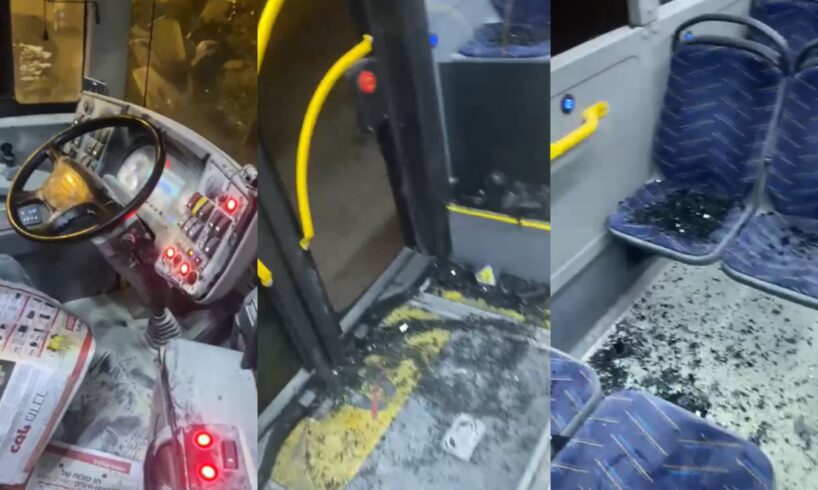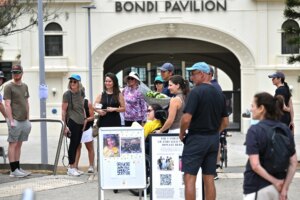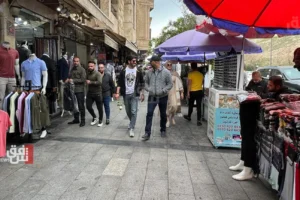
Transit officials are reporting a spike in racist violence against Arab bus drivers in Jerusalem, with at least a dozen attacks in the past week alone.
The trend has intensified this year, particularly in the capital, where many drivers are Arab. But this week was especially violent — assailants shattered bus windows, pepper-sprayed and beat drivers as well as fare inspectors and passengers, landing several people in the hospital.
Muhammad Abu Zina, one of the targets of these recent attacks, said he no longer feels safe heading to work after he was injured Thursday afternoon by a group of young Haredi protesters during a demonstration against army conscription.
“They came to my bus and started to curse at me, call me a ‘terrorist’ and spit on me,” he recounted to The Times of Israel. Abu Zina, who lives in East Jerusalem’s Kafr Aqab neighborhood and drives for the Extra bus company, confessed to having previously felt unsafe while working, but noted that this time was different.
Abu Zina recounted how he stood idle in traffic for around an hour before a group of teenage boys began to bang on the bus windows and throw objects at the vehicle.
Get The Times of Israel’s Daily Edition
by email and never miss our top stories
By signing up, you agree to the terms
“You’re stuck, can’t go back and can’t move forward, and then they catch the bus and no one comes to help,” he said.
He recalled seeing a Jewish bus driver from the Egged company at the scene of the protest, unable to continue his route amid the massive crowd. That bus was trashed as well, but demonstrators didn’t hurt him, Abu Zina said.
Footage shared by Abu Zina showed dozens of ultra-Orthodox protesters gathered around his bus as he can be heard repeating “move, move” to no effect. The crowd, meanwhile, is heard shouting and throwing objects at the bus.
“They came onto the bus, took the fire extinguisher and used it on me,” he said. They then attacked him directly, slamming the door to the driver’s booth on his leg, injuring him.
He said that an older Haredi man then intervened, telling the youth to get off the bus and leave him alone. Abu Zina called the ambulance and checked into Hadassah Hospital on Mount Scopus.
Shortly after Abu Zina was attacked, another driver for Extra had his bus windows broken by protesters near the entrance to Jerusalem, under the Chords Bridge, during a later Haredi demonstration.
The aftermath of one of a dozen attacks on buses and bus drivers to take place in Jerusalem this past week, carried out by Haredi anti-draft protesters near the city’s entrance last night. Video shared by the Bus Drivers Association pic.twitter.com/Bbwg0wRmAM
— charlie summers (@cbsu03) November 7, 2025
A day prior, on Wednesday evening, Imam Amer, 46, who works for Tnufa, was driving from Beit Shemesh to Jerusalem. At one point on the route, a young man boarded his bus at one of the stops and held the door, demanding that he wait for his friend.
“I said, ‘Sir, I can’t wait for your friend. Either board the bus or wait with him for the one that comes after me,” recalled Amer. But the man didn’t let up, and stayed holding the door.
Amer told The Times of Israel that the man then started to curse him as he implored the man to board. When his friend arrived, both began to beat the driver, punching him in the face several times. Other passengers called the police and an ambulance, and he was shuttled to the hospital.
When responding to a request for comment, police did not specify whether they apprehended any suspected attackers in the aforementioned incidents. They noted, however, that officers arrested two teenagers from East Jerusalem who threw stones at a bus in Neve Yaakov.
Police said that officers “act decisively against any violent incident, especially when it comes to attacks against bus drivers and other public servants.”
“With every report received, an investigation is opened, professional actions are carried out to find those involved and bring them to justice, and in many cases suspects have been arrested and indictments have even been filed,” they stated in a response.
Attacking drivers ‘without fear’
According to Abu Zina, his assailants were able to wreck the bus “without fear.”
“They broke the windows, laid waste to everything while knowing that nothing would happen to them. If they knew they would get taken in by the police, they wouldn’t have done this,” he lamented.
The driver said that he called the police twice during the protest, first when people began to wreck the Egged driver’s bus, and a second time as they stood outside his own door, trying to get in.
“Let’s say the opposite were to happen, if a bus were to get attacked in East Jerusalem. They [police] certainly wouldn’t behave this way. Even if the attacker were a 10-year-old, they’d arrest him, arrest the parents and cause him a lot of trouble,” he said.
While most managers for bus companies and bus drivers’ unions maintain there is no hard proof that assailants target Arabs in particular, drivers themselves insist that many attacks are motivated by anti-Arab sentiment.
Abu Zina and others had been labeled a “terrorist” by their attackers. After Beitar Jerusalem soccer games, fans returning home have several times attacked drivers while shouting “Death to Arabs.”
After a lost match Monday night, Beitar fans blocked a Superbus vehicle, threw a flare in front of the bus and broke its windows, all while chanting the racist slogan. They then attacked a driver and a fare inspector, both of whom were Jewish, according to Haaretz.
תיעוד תקיפה שביצעו אוהדי בית”ר באוטובוס בירושלים, השבוע.
שימוש לפי סעיף 27א’ לחוק זכויות יוצרים pic.twitter.com/2GF3LW6qfc
— הארץ חדשות (@haaretznewsvid) November 5, 2025
That same day, on another bus route, teenagers cursed and pepper-sprayed fare inspectors and a bus driver, after the inspectors had fined a woman for not paying when she boarded. The attack injured several passengers as well. It was one of four pepper-spray incidents to occur within 24 hours on a Jerusalem bus.
Speaking to Haaretz about the incident, driver Riyad al-Husseini said he resigned from his job the very next day. “I don’t want to set out for work without knowing whether or not I’ll come back,” he told the outlet.
A Superbus at the entrance to Jerusalem, on August 1, 2022. (Olivier Fittousi/Flash90)
The Power to Workers union, which represents bus drivers for the Superbus transit company, had been ringing the alarm bells this past summer about an uptick in assaults on transit workers. Attacks had been occurring on average twice a week then, but now seem to be getting worse.
Israel Ganon, chairman of the Bus Drivers Association, said that much of the rampant violence is concentrated in Jerusalem.
“We are very angry at the police and the mayor because no one is doing anything to stop this,” he said. “We know that there are specific areas and time periods that are problematic — like after soccer games, for example, in which security is needed.”
He accused authorities of neglecting the issue. “There is no punishment by judges, there is no enforcement from police, and this leads to the violence; it’s a very simple situation,” he said.
For Ganon, the phenomenon is particularly worrisome because most attackers are not so-called “criminal youth” from the fringes of society, but belong to regular, law-abiding families. “The issue is becoming something societal, which is very bad,” he said.
An election campaign poster of Jerusalem Mayor Moshe Lion in the municipal elections on a bus, in Jerusalem, February 21, 2024. (Chaim Goldberg/Flash90)
Israel is already experiencing a shortage of bus drivers, and the uptick in violence against transit workers stands to only worsen the deficit. Since the COVID-19 pandemic, the country has experienced a consistent shortage of some 5,000 bus drivers, according to Hebrew outlets.
According to Ynet, there are 60,000 licensed bus drivers who have chosen a different career, with bus drivers’ unions blaming the shortage on violence, meager and stagnant wages, and long work hours.
“There are many bus drivers in this country, so why are they not working? Because of the violence. You serve the passengers, but they behave as if you are their dog,” Abu Zina said.





